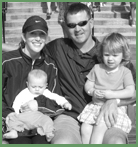Julie

“I was filled with anxiety. I had no appetite and lost 15 pounds. I couldn’t concentrate. Everything seemed hopeless. This went on for several months and I had no idea what was wrong with me.” A friend encouraged Julie to go to the health center. But in 1990, depression was not well recognized or understood. The university psychologist said Julie was simply homesick. After dropping out of school, she was diagnosed with depression. She got well with medication, but when she stopped her medication she became ill again and dropped out of school.
Facing The Truth
For a while, Julie was embarrassed about her depression. “It was disastrous for me to have to drop out of school and go home – twice! I felt so weak and wondered why other people seemed to be doing fine and I just couldn’t get it together. After I was diagnosed, I found out that my uncle and grandmother had both battled depression too, but nobody had ever talked about it.”
After graduating from college, Julie married. Then, she got pregnant with her first child. This time, though, Julie knew that major life transitions increased her risk of relapsing, so she continued taking her medication throughout her pregnancy. While she did experience postpartum depression, it was not severe and she was able to manage it by increasing her medication.
Depression in the Workplace
Julie is fortunate to work for Ernst & Young, recently selected as one of the Top 100 Companies to Work for by Fortune 500 Magazine.
“Ernst & Young is a huge company. But my group is very small,” Julie explains. “My boss is a very understanding man. His philosophy is that everyone should put themselves first, their family second, and their job third. If you do that, he says that you’ll be more productive at home and at work. It’s not just a slogan for him. He follows that philosophy himself and encourages us to do the same. When I came out about my depression to Ernst & Young, I was very fortunate because of him. I never had to worry about my job or that he would think I couldn’t handle it. Because he understood depression, he was like my safety net.”
Recently, Julie started helping Families for Depression Awareness as a volunteer. When Families for Depression Awareness suggested that she tell her story to employees at E&Y, she agreed. Julie and the organization worked together to develop a story for the Daily Connection, an Ernst & Young email newsletter that goes out to several thousand employees. As a result, Julie received many emails from associates who have experienced depression personally or who have loved ones who have depression. Men, women, partners, associate directors, managers, an operations coordinator and others shared their stories with her. “I thanked them for their supportive emails and open communication,” says Julie.
“I’m at peace with it now,” Julie says about going public. “It is just more important to get the word out than to be embarrassed.”
“If it were cancer or any other medical condition, everyone would talk about it and we would get the support we need,” Julie says. “With depression, though, so many people suffer alone for no reason. It’s just not treated like other illnesses. Without awareness, depression creates a vicious cycle. You feel bad. You think you are the only one. You don’t talk about it. You feel worse. Depression is extremely treatable in most people. Even those with treatment-resistant depression can be helped to some degree. There is just no reason for people to suffer in silence anymore.”

